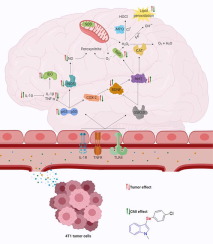当前位置:
X-MOL 学术
›
Brain Behav. Immun.
›
论文详情
Our official English website, www.x-mol.net, welcomes your
feedback! (Note: you will need to create a separate account there.)
The antioxidant and immunomodulatory compound 3-[(4-chlorophenyl)selanyl]-1-methyl-1H-indole attenuates depression-like behavior and cognitive impairment developed in a mouse model of breast tumor
Brain, Behavior, and Immunity ( IF 8.8 ) Pub Date : 2020-02-01 , DOI: 10.1016/j.bbi.2019.12.005 Angela Maria Casaril 1 , Micaela Domingues 1 , Suely Ribeiro Bampi 1 , Darling de Andrade Lourenço 1 , Thiago Ângelo Smaniotto 1 , Natália Segatto 2 , Beatriz Vieira 3 , Fabiana K Seixas 2 , Tiago Collares 2 , Eder João Lenardão 3 , Lucielli Savegnago 1
Brain, Behavior, and Immunity ( IF 8.8 ) Pub Date : 2020-02-01 , DOI: 10.1016/j.bbi.2019.12.005 Angela Maria Casaril 1 , Micaela Domingues 1 , Suely Ribeiro Bampi 1 , Darling de Andrade Lourenço 1 , Thiago Ângelo Smaniotto 1 , Natália Segatto 2 , Beatriz Vieira 3 , Fabiana K Seixas 2 , Tiago Collares 2 , Eder João Lenardão 3 , Lucielli Savegnago 1
Affiliation

|
Psychiatric alterations are often found in patients with breast cancer even before the initiation of adjuvant therapy, resulting in a poor quality of life. It has become accepted that neuroinflammation and oxidative stress are involved in the pathophysiology of depression and cognitive impairment. Herein, we tested the hypothesis that treatment with the antioxidant and immunomodulatory selenium-containing compound 3-[(4-chlorophenyl)selanyl]-1-methyl-1H-indole (CMI)could attenuate behavioral and neurochemical alterations in a mammary (4T1) tumor model. Female BALB/c mice were subcutaneously inoculated with 4T1 cancer cells (1 × 105 cells/mice) or PBS. From days 14 to 20, mice received daily gavage with canola oil or CMI. On day 21, mice were submitted to behavioral tests followed by euthanasia. We found that CMI did not alter tumor growth, body weight, and body temperature in tumor-bearing mice. Importantly, treatment with CMI abrogated tumor-induced depression-like behavior and cognitive impairment. By the time CMI improved the behavioral alterations, it had reduced tumor-induced neuroinflammation (altered expression of NFκB, IL-1β, TNF-α, IL-10, IDO, and COX-2) and oxidative stress (altered expression of iNOS and Nrf2, and levels of reactive species, nitric oxide, lipid peroxidation, and superoxide dismutase activity) in the prefrontal cortices and hippocampi of mice. A molecular docking approach suggested the ability of CMI to inhibit the activity of iNOS and COX-2. Together, our results indicate that CMI treatment may attenuate depression and cognitive impairment in 4T1 tumor-bearing mice, and be a groundbreaking strategy for the treatment of cancer-related psychiatric symptoms to improve the quality of life of cancer patients.
中文翻译:

抗氧化剂和免疫调节化合物 3-[(4-氯苯基)selanyl]-1-methyl-1H-indole 减轻在乳腺肿瘤小鼠模型中产生的抑郁样行为和认知障碍
甚至在开始辅助治疗之前,就经常在乳腺癌患者中发现精神改变,导致生活质量低下。人们普遍认为,神经炎症和氧化应激与抑郁症和认知障碍的病理生理有关。在此,我们测试了以下假设:用抗氧化剂和免疫调节性含硒化合物 3-[(4-chlorophenyl)selanyl]-1-methyl-1H-indole (CMI) 治疗可以减轻乳腺 (4T1) 的行为和神经化学改变肿瘤模型。雌性 BALB/c 小鼠皮下接种 4T1 癌细胞(1×105 个细胞/小鼠)或 PBS。从第 14 天到第 20 天,小鼠每天接受灌胃菜籽油或 CMI。在第 21 天,对小鼠进行行为测试,然后进行安乐死。我们发现 CMI 并没有改变肿瘤的生长,荷瘤小鼠的体重和体温。重要的是,CMI 治疗消除了肿瘤诱导的抑郁样行为和认知障碍。当 CMI 改善行为改变时,它已经减少了肿瘤诱导的神经炎症(改变了 NFκB、IL-1β、TNF-α、IL-10、IDO 和 COX-2 的表达)和氧化应激(改变了 iNOS 和Nrf2 以及小鼠前额叶皮质和海马中的活性物质水平、一氧化氮、脂质过氧化和超氧化物歧化酶活性)。分子对接方法表明 CMI 能够抑制 iNOS 和 COX-2 的活性。总之,我们的结果表明,CMI 治疗可以减轻 4T1 荷瘤小鼠的抑郁和认知障碍,
更新日期:2020-02-01
中文翻译:

抗氧化剂和免疫调节化合物 3-[(4-氯苯基)selanyl]-1-methyl-1H-indole 减轻在乳腺肿瘤小鼠模型中产生的抑郁样行为和认知障碍
甚至在开始辅助治疗之前,就经常在乳腺癌患者中发现精神改变,导致生活质量低下。人们普遍认为,神经炎症和氧化应激与抑郁症和认知障碍的病理生理有关。在此,我们测试了以下假设:用抗氧化剂和免疫调节性含硒化合物 3-[(4-chlorophenyl)selanyl]-1-methyl-1H-indole (CMI) 治疗可以减轻乳腺 (4T1) 的行为和神经化学改变肿瘤模型。雌性 BALB/c 小鼠皮下接种 4T1 癌细胞(1×105 个细胞/小鼠)或 PBS。从第 14 天到第 20 天,小鼠每天接受灌胃菜籽油或 CMI。在第 21 天,对小鼠进行行为测试,然后进行安乐死。我们发现 CMI 并没有改变肿瘤的生长,荷瘤小鼠的体重和体温。重要的是,CMI 治疗消除了肿瘤诱导的抑郁样行为和认知障碍。当 CMI 改善行为改变时,它已经减少了肿瘤诱导的神经炎症(改变了 NFκB、IL-1β、TNF-α、IL-10、IDO 和 COX-2 的表达)和氧化应激(改变了 iNOS 和Nrf2 以及小鼠前额叶皮质和海马中的活性物质水平、一氧化氮、脂质过氧化和超氧化物歧化酶活性)。分子对接方法表明 CMI 能够抑制 iNOS 和 COX-2 的活性。总之,我们的结果表明,CMI 治疗可以减轻 4T1 荷瘤小鼠的抑郁和认知障碍,









































 京公网安备 11010802027423号
京公网安备 11010802027423号